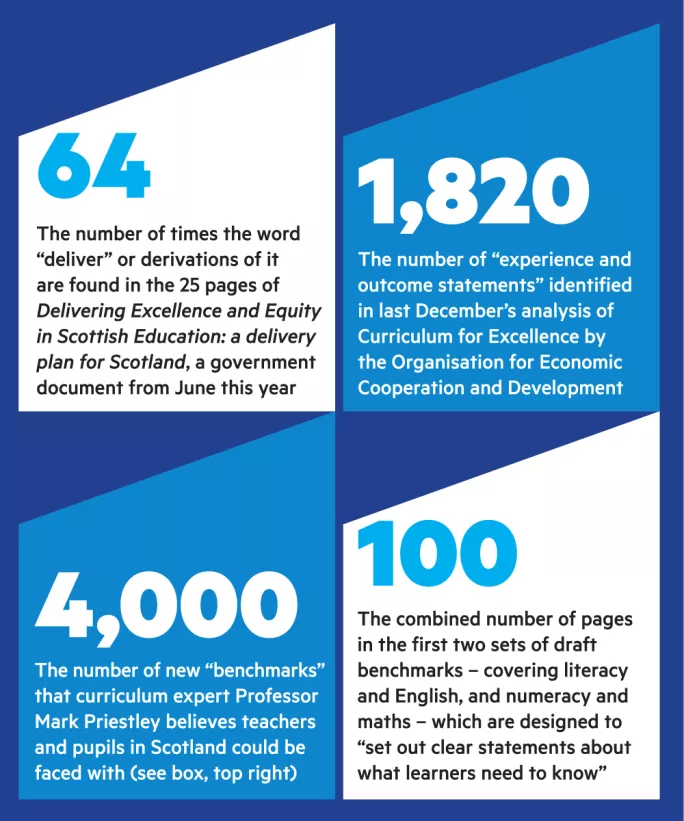
Schools can’t close the gap on their own, expert says

Teachers are unfairly being held responsible for closing Scotland’s notorious attainment gap, according to a world-leading curriculum expert.
Jan van den Akker, of the Netherlands’ National Institute for Curriculum Development, criticised the Scottish government for being “overly optimistic” about the difference schools could make, given that the educational divide between rich and poor was largely formed outside the classroom.
Meanwhile, another international expert has lamented the changing nature of Curriculum for Excellence - once an example to the world but now “robbed” of its “powerful” message.
Professor van den Akker acknowledged that Scotland had admirable aims for “excellence and equity” in education - first minister Nicola Sturgeon has said her government should be judged on whether it eliminates the attainment gap - but added that it was essential to take a “realistic” view about the influence of education.
“Housing, income, the labour market, the health sector - you name it, many factors and perspectives are important for addressing equity issues,” he said. “Why so much emphasis on placing all of the burden on [education]? It’s overly optimistic.”
‘All the talk of “delivery” makes people in Scottish education sound like postmen’
This approach led to “frustration and disappointment” when it became clear that “schools cannot complete this task”, Professor van den Akker added - and this should not come as a surprise. As long ago as 1966, pioneering US sociologist James S Coleman showed that “schools cannot compensate for all the flaws and shortcomings of society”, he said.
Professor van den Akker’s spirited comments were made last week at an event marking the launch of the Stirling Network for Curriculum Studies, where another high-profile international speaker was Anne Looney, director of the Republic of Ireland’s Higher Education Authority.
She recalled the “ripples of excitement” that CfE had caused “around the English-speaking world” - but regretted a “very noticeable” change. CfE had gone from saying “really powerful things about what we want for learners and what we want for Scotland to using much more generic language around ‘delivery’ and ‘improvement’ ”, she said. “It sounds different - it sounds less expansive, it sounds less open.”
While CfE had initially made an impression globally by prioritising teachers’ “professional judgement”, now - in a trend also seen in other countries, including Ireland - conversations about curricula were being sidelined amid ever-growing demands for teachers to take on “the delivery imperative, the quality imperative, the closing the gap imperative”, Dr Looney said.
“A generic policy language has robbed education of something, and I think there’s a missing piece of the landscape,” she added.

‘Tired and discouraged’
Similarly, Professor van den Akker - who was introduced at the event as a “seminal thinker on the curriculum” - was “a bit amazed and almost taken aback by this enormous emphasis all the time on ‘delivering’ and ‘delivery’ ”. This, he quipped, made people working in Scottish education sound like “postmen”. He added: “It’s a nation of ‘deliverers’ here. I got so tired [and] discouraged from reading all this.”
The event was run by the University of Stirling and the General Teaching Council for Scotland. GTCS chief executive Ken Muir told TESS that there was some truth in Professor van den Akker’s views about the burden placed on teachers.
There were “very high expectations of teachers”, who had “a major role to play” in closing the gap, but that should also involve close work with other professionals such as social workers, Mr Muir said.
He added that Scotland had long championed the community schools model, which brought teachers closer to other professionals - although such efforts had been partly curtailed by budget cuts, leading, for example, to declining numbers of “campus cops”.
A Scottish government spokesman said: “We fully recognise that schools can’t [tackle the attainment gap] alone and we all have a part to play in creating a fairer, more successful country. That is why we have launched the Fairer Scotland Action Plan and are introducing the Child Poverty Bill.”
Education secretary John Swinney had given teachers a “clear, simple, concise statement of the CfE framework” and benchmark guidance, due to be published soon, which would “consolidate and replace a much larger volume of existing material”, the spokesman added. “It is being provided in response to demand from practitioners and has been broadly welcomed by the profession.”

You need a Tes subscription to read this article
Subscribe now to read this article and get other subscriber-only content:
- Unlimited access to all Tes magazine content
- Exclusive subscriber-only stories
- Award-winning email newsletters
- Unlimited access to all Tes magazine content
- Exclusive subscriber-only stories
- Award-winning email newsletters
You need a subscription to read this article
Subscribe now to read this article and get other subscriber-only content, including:
- Unlimited access to all Tes magazine content
- Exclusive subscriber-only stories
- Award-winning email newsletters
- Unlimited access to all Tes magazine content
- Exclusive subscriber-only stories
- Award-winning email newsletters